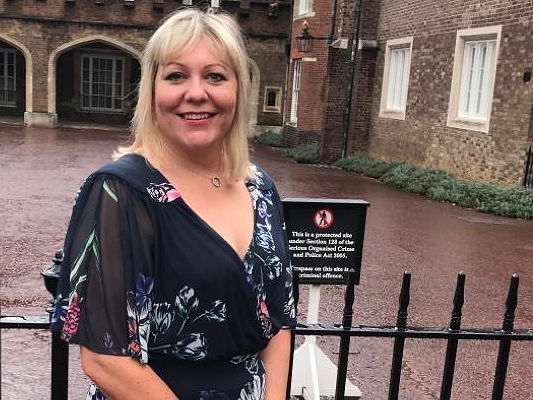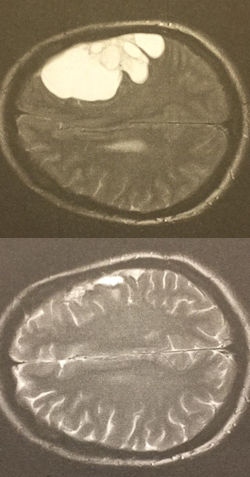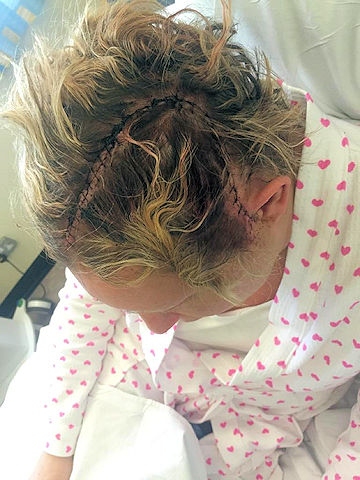“Even though I’m dysfunctional, I’m still okay,” says mum-of-two after learning to live with a brain injury
Date published: 19 February 2020

Joanne Wood
Three years ago, Rochdale resident Joanne Wood, mother of a then-19-year-old and 21-year-old daughters, underwent a six-hour surgery to remove a tumour from her brain, and was left determined to return to a normal life with her family.
The 48-year-old was working at a school as a sign language interpreter for deaf children on 10 June 2016 when she struggled to answer a question that the teacher asked. Unbeknownst to her at the time, she was having a seizure.
Joanne recalls vividly: “It was like the words had just gone out of my head, and I just blanked… I got a facial droop, so my face on one side went down, and then panic started because someone said, ‘she’s having a stroke!’, and I was awake. I knew I wasn’t having a stroke. I just knew something wasn’t quite right.”
It was after being rushed to the hospital when Joanne was told that she had a large mass on her brain, which was why she couldn’t speak, and she needed to be transferred to a specialist hospital, Salford Royal.

Bottom: a scan of Joanne’s brain after the surgery
She explains: “I went there, and they did more scans on me. All day, in and out of tubes, all sorts of stuff happening, not being able to speak still. Nobody in the hospital understood me, nobody understood sign language.”
Joanne remembers how she suffered from migraines for two years prior to her seizure and visited four different doctors to understand why.
“I’d be very busy at home […] at church […] with the neighbours, always doing stuff,” she shares, “but I got to a point where I was always tired all the time, coming home from work and sitting down with a brew, then I’d fall asleep.
“Twice I was driving and ended up on the other side of the road and woke up and thought, ‘gosh, I’m so tired’. I remember going to the doctors and saying, ‘something isn’t right, I can feel this pressure all around here’, and they would say, ‘you’ve got a chest infection, you’ve got an infection in your face’, and it just went on like that. Loads of symptoms of a brain tumour, but also symptoms of other things. You would never put them together.”
When she arrived at Salford Royal, Joanne was told she needed emergency surgery to remove the tumour from her brain.
“I had no idea what that involved,” she remembers. “I thought it might be a little cut in my head and it wasn’t. But they said, ‘if you don’t have it, you will have a stroke, and there’s a possibility you’ll have a severe disability or even die. But even with the surgery, there’s a very high risk of you having those disabilities anyway. We do expect you to possibly not be able to speak after it, there could be deafness, there could be blindness, and one side of your body will probably be affected’.”
Joanne’s tumour is an unusual one, as the doctors weren’t sure how she coped all this time with its large size. They believe she may have had it growing in her for twenty years, labelling it a Grade 1 non-malignant tumour. Because of this, she is used as a case study and being monitored for progress.


Benign, or non-cancerous, tumours tend to grow more slowly and do not spread, although people can have more than one benign tumour. A benign brain tumour can put pressure on the brain as it grows inside the enclosed space of the skull, and this may compress and damage healthy tissue.
After the surgery, which removed 90% of the tumour, she was left with a brain injury and in intensive care for eleven days. The remaining part of the tumour, which was too dangerous to remove, will be monitored for any changes.
She looks back at the photos of herself in the hospital and admits: “Sometimes you can hardly believe it’s happened… when they cut me in surgery, nobody tells you they cut through all the jaw muscles. I couldn’t open my mouth. My face was swollen. I got a black eye, and all down the side of your face starts to come out. And you’ve got a drain in your head, draining out the fluid from your brain.”
Headway, a brain injury association, conducted research on acquired brain injury (ABI) hospital admissions in the UK in 2016-17. They found that there are approximately 954 ABI admissions per day, or one every 90 seconds. You can read more here: www.headway.org.uk/about-brain-injury/further-information/statistics/

Despite these high figures showcasing the severity of ABI admissions, Joanne feels her illness is “invisible”, as she acknowledges that she looks “normal on the outside”, but there’s a lot she can’t do.
“I miss out on a lot, that annoys me,” she said. “Like Christmas time, everybody’s out, they go to the Christmas markets, they go shopping. I don’t go […] because I can’t cope. There’s too much on display… so, that’s why everything is so organised in my life.
“I’ve lost numbers, I can’t add up the same… I used to work in a school and teach maths, and now I’m the person struggling.
“They said once you’ve done two years, that’s your recovery time, but that’s not true. I’m still recovering, I’m still doing more stuff now.”

Joanne mentions how she looked to her faith even more during her recovery, explaining how she’d wake up in the night and think about Psalm 23 in the Bible for comfort. “I started to read. I couldn’t at first, I found it difficult to take in the information, but from reading that, I started to change the words and put them in my English, and that would be something I’d read quite a lot in a state of panic, and it would be a reassurance.”
From here, Joanne wrote poetry as a form of self-expression. She says how she got in touch with Headway and wrote a blog for them, and eventually her church asked her to contribute to a women’s conference they were having. From that came her book.

Her book, ‘I Choose’, took three months to write, and features passages from the Bible, along with advice from Joanne herself, to others who may be suffering in life. It was a massive part of her recovery.
Joanne said: “My recovery would be nowhere near where it is now if it weren’t for family.” She shares how her mum was home to visit, and she was able to help with her two daughters who had come back from university. Her husband was also there to support her. She added: “There was never any doubt with him that I wouldn’t get better.”
She goes to the doctors for monthly neuropsychology appointments and blood tests, and has a yearly scan to see if the tumour has grown back.
Joanne said: "It’s only in the past six months that I have felt that it’s going to be okay. My identity is so different now, but the value of myself is no different than the person before.”
Aroob Raja
Do you have a story for us?
Let us know by emailing news@rochdaleonline.co.uk
All contact will be treated in confidence.
Most Viewed News Stories
To contact the Rochdale Online news desk, email news@rochdaleonline.co.uk or visit our news submission page.
To get the latest news on your desktop or mobile, follow Rochdale Online on Twitter and Facebook.

